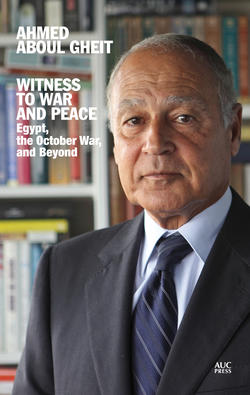Читать книгу Witness to War and Peace - Ahmed Aboul Gheit - Страница 8
На сайте Литреса книга снята с продажи.
ОглавлениеFOREWORD to the English Edition
Francis J. Ricciardone
President, The American University in Cairo
Ahmed Aboul Gheit is one of the last of the living giants of Egyptian statecraft whose lives have spanned the end of the Egyptian monarchy, the establishment of the modern Republic of Egypt through successive revolutions and elections, the establishment of the State of Israel, and the several wars and still unfolding story of the complex peace between those two modern states and their neighbors. During this period, modern successor states to the Ottoman Empire, from North Africa through the Gulf, have arisen, and some have collapsed. In several cases, most notably that of the Palestinians, people of former Ottoman lands continue to struggle to establish fully independent states or, in the case of the Kurds, more or less autonomous sub-state polities. The dynamics between Egypt and Israel have always proven pivotal and central to the fate of the entire region. The future of Palestine, in particular, certainly hangs in that balance.
The great modern drama of state genesis and failure across MENA has engendered rich scholarly documentation and study, particularly in English. Yet, firsthand memoirs by leading Egyptian players are scarce, even in Arabic. Hence, much of even the most insightful analysis of Egyptian decision-making through Egypt’s succession of modern wars and crises amounts to commentary by keen observers at some distance in time and space from the Egyptian figures themselves. The past great leaders in modern Egyptian–Israeli–Palestinian and broader Arab affairs—Presidents Nasser, Sadat, and Mubarak—regrettably have left scholars no published memoirs comparable to the records published by their Israeli or American counterparts and their senior diplomatic and military advisors. As Aboul Gheit has pointed out, other influential statesmen of the inner decision-making circle around Presidents Sadat and Mubarak, such as Osama al-Baz and Ahmed Maher al-Sayed, have each passed away without having recorded their testimonies of this dramatic period in global affairs. Such historical personal diaries or archival official documentation as the presidents and their senior advisors may have generated are not readily available even to the most reputable private scholars, as a matter of Egyptian state policy. Aboul Gheit cites the absence of published memoirs as what compelled him to record his own direct observations.
Hence, Ahmed Aboul Gheit’s Witness to War and Peace would be of unusual importance to Arab and international scholars if only for the scarcity of other documentation, especially as published in English, by Egyptian participants in, and witnesses to, leadership decision-making in the era of war and peace, and in the genesis and failure of post-Ottoman and other foreign imperial-era states and aspirant states. But his work also stands out for its candor and authenticity, based on contemporary personal notes recording his own thinking and reactions to major historical developments.
Aboul Gheit’s record of the personalities and thinking of Egypt’s top decision makers in times of crisis is fascinating for its intimacy and contemporaneity. These influential figures are too little known even to the rising generation of Egyptians, much less to foreigners. But of equally compelling value to the student of modern Egyptian and regional history is Aboul Gheit’s presentation of his own personality and analytical outlooks as a proudly Egyptian nationalist and statesman.
I was a young American student of foreign and regional affairs, and a very junior American diplomat, during most of the period that Aboul Gheit chronicles in Witness to War and Peace. Only later, as I returned to Cairo in 2005 as the U.S. ambassador, did I have the good fortune to meet and work closely with Aboul Gheit, by then several years into what later would extend to a seven-year tenure as foreign minister of Egypt. The rare privilege of observing how his deep erudition and patriotism shaped his dealings with foreign counterparts, particularly of my own country, proved profoundly illuminating.
Aboul Gheit’s lifetime of continuing national service is as exceptional for its distinction as for its length—yet it authentically represents the characteristic Egyptian traits of deep faith, perspicacity, tenacity, and resilience. His close accounts certainly offer important insights for the rising generation of Egyptians and others who can access Aboul Gheit’s original Arabic editions. But those insights will be of particular value to foreign diplomats, business people, scientists, and scholars, who recognize the importance of deep understanding of this unique, pivotally important, and complex country, as the fundamental requirement for successful engagement with it in any sphere of endeavor. In the service of that high purpose, the American University in Cairo Press is proud to make Ahmed Aboul Gheit’s Witness to War and Peace available to a wider global readership through this English edition.
